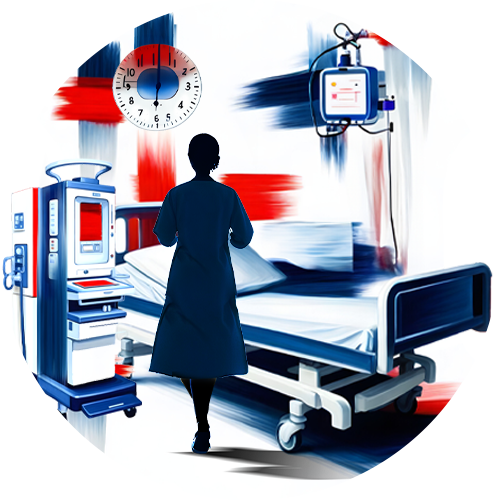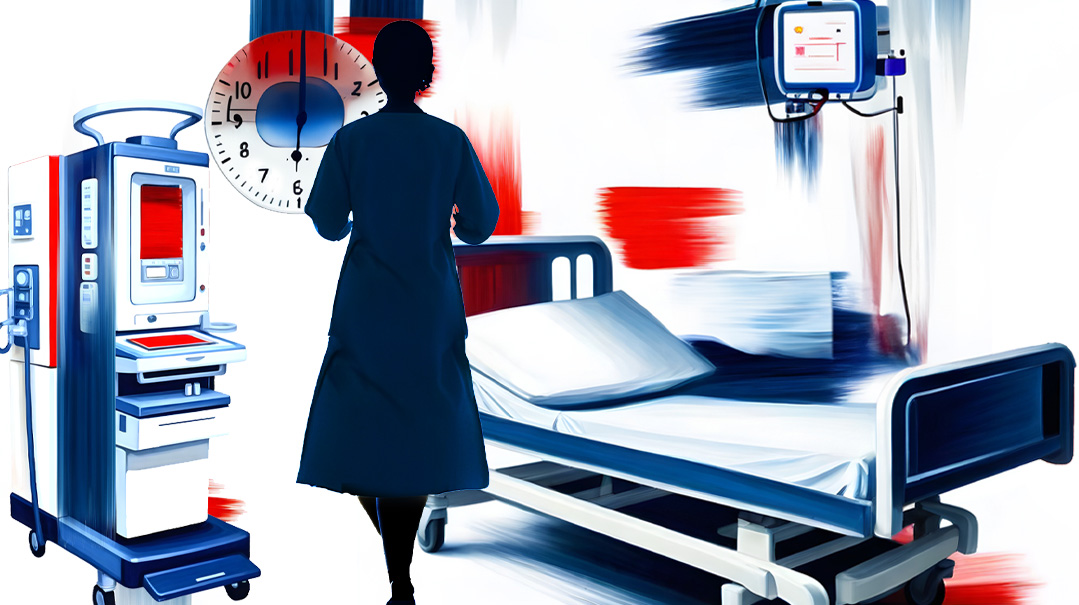On Call — Chapter 11: Resuscitate
| June 18, 2024“I don’t like talking to Jews.” It’s a flat statement, and I’m speechless for a moment

T
he moment of truth. I look at the board in the ICU to see which rooms the senior resident assigned to my care. Second year of residency means three months in the ICU, spread throughout the year, and it’s my last month of the three. Light at the end of residency’s tunnel!
“Lucky you, you’ve got Room 216!” I whirl around to find Julie, one of the ICU nurses, grinning.
“What’s wrong with Room 216?” I ask.
“It’s just an old guy recovering from appendicitis. Surgery is no picnic when you’re in your nineties. I heard he’s a World War II vet.”
“What’s the issue?”
“A real grouch. His bed is never at the right angle, his drinks need more ice…. He rings for us so much I think he’s just bored,” Julie tells me.
“Well, I’m going to be meeting him today,” I say, looking more closely at the chart. “Harold Richards.”
“Good luck,” she murmurs, eyes full of sympathy.
I knock softly on the door to Room 216, noticing that my palms are sweaty. No answer. I enter briskly, with what I hope is a cheerful smile on my face.
“Hello, Mr. Richards. I’m Dr. Rubin, and I’m going to check your incision and see how you’re doing.”
Harold Richards is a wiry man with faded gray eyes and sparse whisps of white hair. He looks at me appraisingly, gaze lingering on my name tag and (atypical) scrub skirt. Then he deliberately turns away from me to gaze at the wall.
Well, that went well.
I still need to examine him, so I ask for permission to check his incision, take his stony silence as acquiescence, and pull down the thin blanket. No signs of abnormal redness or swelling. His vitals look good, too. I smile and discuss his ongoing treatment with two unresponsive shoulders before moving on to greener pastures.
The optimistic nurses predict that Harold will become less grouchy as his wound heals, but he doesn’t get the memo. Even as he recovers, I continue to have a front-row seat to the back of his head. Other patients have visitors or entertain themselves. Harold just stares silently at the four walls — unless he’s complaining.
“I see from your chart that you were a soldier in World War II?” I say brightly. Maybe he’s one of those old soldiers who can’t resist a chance to talk about their campaigning days. But after a few minutes, I conclude that he’s one of the strong, silent types.
“Mr. Richards,” I finally say one day, “If you would talk more, you’d probably feel better. Staring at the walls isn’t good for anyone.”
He finally turns over, his eyes hard.
“I don’t like talking to Jews.”
It’s a flat statement, and I’m speechless for a moment.
“I’m sorry you feel that way,” I respond evenly, recovering. “I was taught by my parents and grandparents to treat veterans as heroes for liberating our people after the War.” He doesn’t answer. I sigh. Only two more weeks until I return to the ER. We’ll just have to push through.
Three days later, I’m frowning as I examine Harold. A congested cough, accompanied by mucus and a high fever are concerning. His incision looks fine, so this must be some bug he’s caught since the operation. Suspecting pneumonia, which would be extremely serious at his age and in his condition, I request a chest X-ray and bloodwork, stat. Within an hour I’m looking at the telltale opacity of both lungs on the X-rays, and I order antibiotics to be administered through his IV. He doesn’t look good, but I have other patients to see, and the nurses will check on him frequently.
Only a few hours later, one of the nurses rushes over. “Dr. Rubin! Oxygen saturation levels are dropping in Room 216!”
It’s terribly rapid deterioration, but Harold is old and frail, and I’m not exactly shocked. Swiftly entering his room, I can see at a glance that we’re in trouble. He’s sweating heavily, gasping as he tries to draw in lifegiving air. There’s only one thing to do — but can I do it?
I’ve seen it on his chart. DNR. Do. Not. Resuscitate. But I also know that faced with death, people often change their minds. They deserve a chance. So does Harold Richards.
“Mr. Richards,” I say quickly. “You signed a DNR, but I want to give you a choice. Your oxygen levels are low, and the only thing we can do is intubate and put you on a ventilator. Is that something you’d want?”
Between panicked gasps, a small nod.
“Bring an airway kit,” I rap out to the nurse.
I order medications; the respiratory therapist and the attending, along with a few more nurses, join the crowd. The ventilator and equipment are swiftly set up while one nurse pushes the medication to sedate the old veteran. It’s a rapid sequence intubation, and as soon as Harold’s out, the attending hands me the endotracheal tube that I need to insert down the trachea and into his lungs.
The curved metal blades of the laryngoscope open his mouth wider and wider, until I see the most beautiful sight in the world — his vocal cords. I slip the tube between them, shortly before the respiratory therapist attaches the other end of the tube to the ventilator. The hiss of air flowing through the ventilator and the beeps from the monitors are the only sounds in the room as we gaze at the very still figure on the bed. Depending on his vital signs, Harold might stay on the ventilator two or three days.
Two days later, with his respiratory status improving, we’re watching the respiratory therapist perform an extubation. Harold coughs, blinks, and then, to our shock, his eyes well with tears.
“Thank you,” he rasps, nodding at me. “For ignoring the DNR. For giving me another chance.”
He doesn’t stop complaining about the angle of his bed or the amount of ice in his water — a new lease on life can’t change everything — but he’s different.
“Good morning, Dr. Rubin,” he says, smiling broadly as soon as I enter his room. He regales me with tales of his days in the army, and I find myself listening attentively.
And he thanks me every day.
“I didn’t know what Jews were like,” he says. “Now I know.”
When he finally leaves, I’m surprised at how much I miss his stories.
But Harold’s shown me that opportunities for kiddush Hashem accompany me everywhere I go, every step I take, with every word I say. I’m so grateful that I’ve been given a chance to resuscitate, not only lives, but perceptions. As long as I’m on call, there will always be new patients to talk to… to heal… and to change.
The characters in this series are composites; all the stories are true.
(Originally featured in Family First, Issue 898)
Oops! We could not locate your form.


